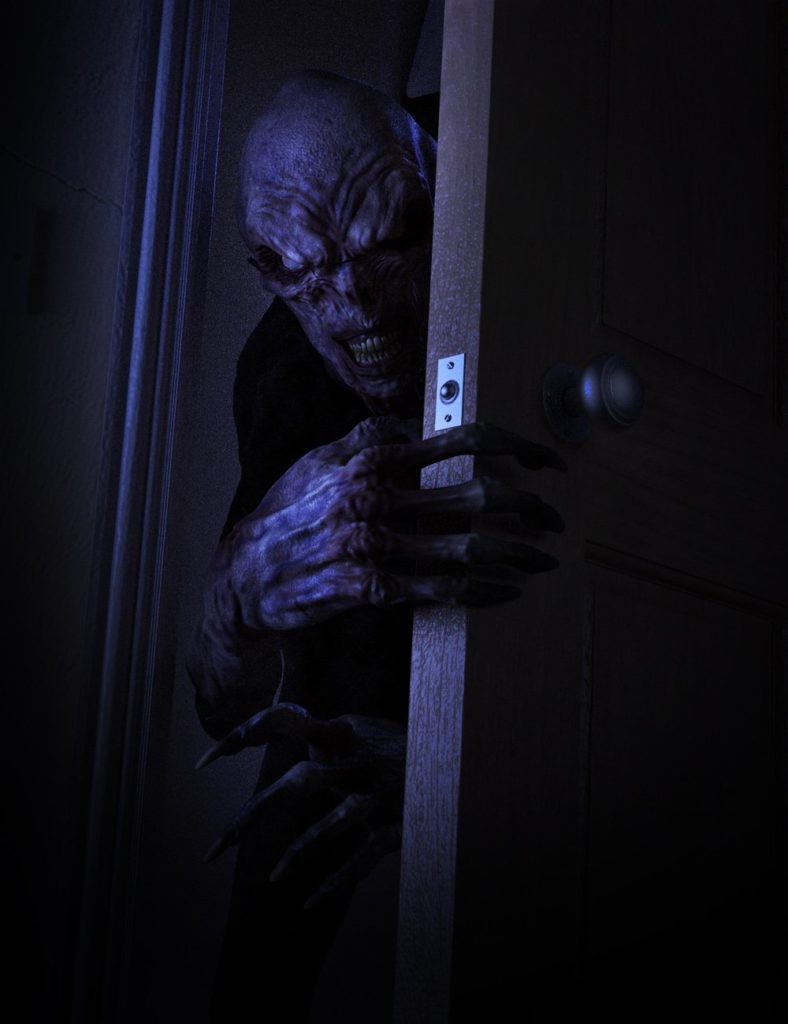The ‘Boogeyman’ has existed since before the birth of everyone reading this. Yes, he does exist. For as much as this being is blamed for, his existence cannot simply be mass hysteria. The Boogeyman is real. Why would so many apparently competent people cower at his approach and hide from his arrival? The Boogeyman’s name is just as known as any pop singer and as feared as Hitler’s Nazis.
The Boogeyman has a long track record of paralyzing supposedly strong people with fear. Everyone fears the boogeyman, but interestingly no one can describe this menacing specter. I’ve never seen an agreed upon sketch of his appearance nor heard an accurate description of his capabilities. Be on the lookout for who or what?
I charge that the Boogeyman is a mental manifestation of our shortcomings.
Therefore, to describe the Boogeyman, look no further than one’s own flaws. Are we prone to cowardice or unpreparedness? Felled by ignorance or lack of skill? We fear the boogeyman in dark spaces as an explanation of not knowing what is there and being unprepared to confront it. Faced with the discomfort of this situational flaw, we assign this shortcoming of courage and ability to the boogeyman.
Shortcomings may be a personal problem, a group problem, a human problem. Upon discovery of a shortcoming, most people inwardly feel shame. Maybe the reason one ‘came up short’ was a lack of ability. Maybe a business or team came up short due to poor preparation. Maybe the shortcoming was uncontrollable, a person’s physical flaw.
The reaction to this shame varies. Some will claim responsibility for their dereliction and set about correcting themselves. If the shortcoming is uncontrollable, an alternative solution may be found; “If I cannot be tall then I’ll be wealthy and ascend to a powerful position over others”. A football team with a struggling quarterback might rely on a strong running back.
But, for those who do not claim responsibility, or act, the Boogeyman appears. They will ascribe their failure to everyone and everything but themselves. Blame and reasons will spill out, and if done with enough emotion, will deflect ownership from themselves. The desire is for there to be an amorphous explanation for their failure, a reason that can be easily named and readily feared, yet spongy enough to be applied in any situation. Thus, they will blame the boogeyman. Remember, the boogeyman has no real description or modus operandi, or clear limitations, so he can be blamed in a wide array of catastrophic failures.
What’s the point of all this?
A black woman I knew feared Barack Obama’s victory in the 2008 election, she felt guilty voting for him because she thought he would be assassinated, and her vote was sending him to his death. Fearing the boogeyman. I was annoyed to hear many black people say, “I never thought they would let us have a black president”. They? There’s that boogeyman again. Amazingly, many whites I knew volunteered without my asking that they knew it would happen one day. But the African American fears some boogeyman will steal the moment, or in the face of failure, blame the boogeyman for the shortcoming.
Our (the African American/black) shortcoming is the reticence to expand our horizons. It may be out of an outdated worry that klansmen are going to ride up to the latest black achievement and burn it down. There are blacks who sabotage their own growth and development with concerns about losing their Black identity or culture. By not stepping outside the box of blackness that we keep ourselves in we only occasionally grow, and often fail. If you doubt this visit any black owned business and in most cases the shortcomings are blatant. But, in most cases, they are a reflection of their community, whose shortcomings are blatant.
In black culture, we have the comfort of blaming the boogeyman. All one must do is shout racism and attribute their failure to a white person(s), and sympathetic African Americans will nod in agreement with absolutely no investigation of the circumstances. Lack of effort is explained away by, “. . .them white folks (boogeymen) ain’t gonna let you do that.” When I listen to the up-and-coming cadre of black politicians or self-appointed black leadership, they manage to use the boogeyman to deflect shortcomings while portraying every success as a racial contest and having outplayed the boogeyman (“so and so is the first black to do this or that”, as if some wall has been climbed over. Once we had a black president, the ‘firsts’ after that are moot).
White America is not being let off the hook by this essay. The problem started and continued with them. America employed half measures for a hundred years that never really addressed the problem of its kidnapped/human trafficked population. The Southern population was let off easy after the Civil War and rather than humble themselves as the Christians they claim(ed) to be/are, they killed the President that made slavery abolishment his signature act. They formed a domestic terror group that embarked on a brutal campaign to subjugate their dark-skinned neighbors who were struggling to get on their feet. They created all sorts of local government policy to further cripple the former slaves for the next hundred years. There is a LOT of good reason for the black community to fear boogeymen.
The problem is that laying out the above becomes an excuse for too many in the ‘Black Community’ to engage in self-destructive behaviors. Every move is punctuated by fears of the boogeyman. Caucasians, the white man, ‘white supremacy’, white privilege–whatever awkward description we employ, are our boogeymen. I suggest that some of us unconsciously need white men to be evil. Their past crimes provide cover for black shortcomings. How else do we explain that despite numerous exorbitantly funded liberal efforts a large percentage of the black population still wallows in poverty and dysfunction? Their past racism/colonialism overshadows the African lack of preparedness, and the questioning of that, that never takes place.
Before this essay, where or when was the uncomfortable question asked, “Why was there no organized military and government in the African states to send away these European kidnappers? The scientific fact that African men were first on this earth but so easily exploited by the follow-on races that came later I find embarrassing. Therefore, our fear of boogeymen (white men) comes from being unprepared. Our rage at the boogeyman is a result of him taking advantage of our unpreparedness.
I will never suggest that any of the ‘isms’ are completely extinguished, or that the boogeyman will no longer plague our worries. What I am suggesting is that continued blaming of the boogeyman for tripping up black ascendancy makes him seem prolific and us (blacks) seem easily disrupted. Any person, or group, or institution, or formation of actors, must conquer it’s shortcomings. Doing so renders the boogeyman irrelevant. Unless some of us are afraid of growth, or expansion, or ascendancy; in that case, then we still need the boogeyman . . .




Ehhhh